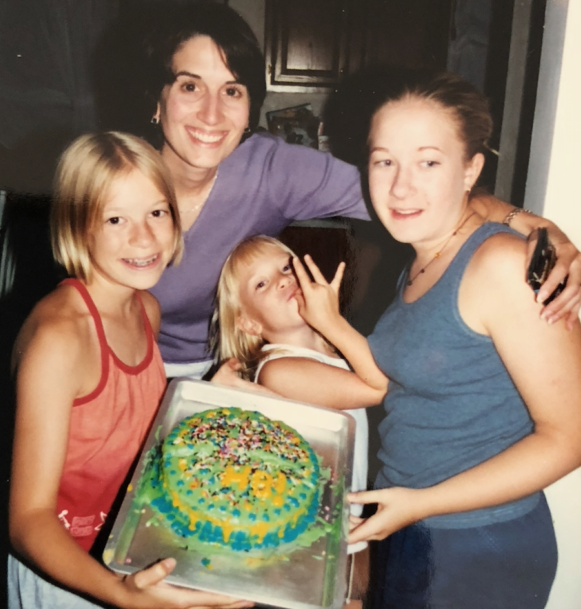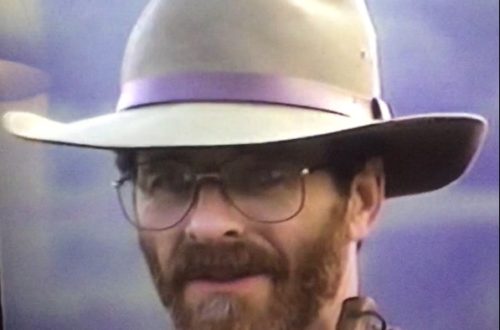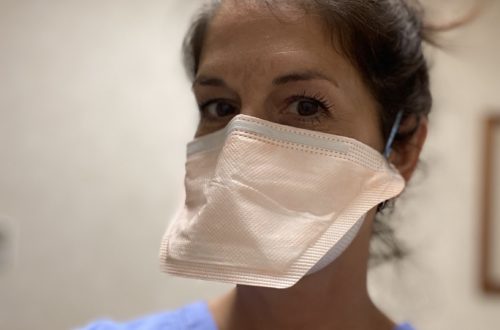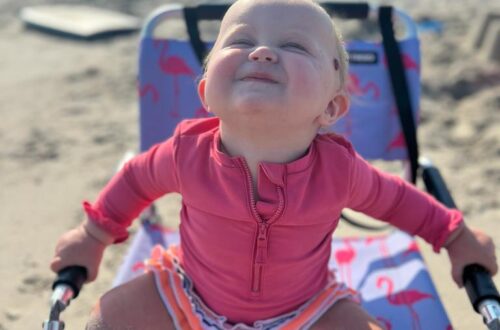
#T1DLooksLikeMe
When someone learns that I have Type 1 Diabetes, my usual response is “Yes, yes, I do, but, no worries, it’s not a big deal, I am fine with it.”
I was diagnosed with Type 1 on August 15, 2000, at the age of 29.
A month previous, my mom was diagnosed with breast cancer. That was devastating to me. My mom had a relatively easy time of it. She had surgery, radiation, meds, and recuperated well. At the time of her diagnosis, I didn’t know the happy ending. I was upset, stressed, and worried, the perfect storm for an autoimmune disease like Type 1.
Two weeks later, I start drinking large amounts of juice to quench my undying thirst. I constantly have to urinate. I am losing weight and I am exhausted. For a short time, this is all explained away. “I am thirsty because I had too much salt yesterday. I have to pee because I drank so much. I am tired because I am working in my first practice, trying to prove myself as a young optometrist.”
Soon, I make an appointment with a local doctor to whom I regularly refer my own patients. She fits me into her schedule within a few days. She takes my blood sugar and it is high, but she doesn’t voice her specific concerns. The doctor sends me for more blood work. She makes an appointment for me with an endocrinologist the next day, with the instructions to “not eat any sugar”. She never says that she thinks I have diabetes, or at least, I don’t hear it.
For my endocrinologist appointment, I was told not to eat anything before the visit. My fasting blood sugar reading is 250. Normal is below 100. Again, the endo never told me that I had diabetes. At least I don’t hear it.
Then, I am handed over to a nurse who places a syringe, a vial of insulin, and an orange on the table in front of me. She explains to me how to fill the needle with insulin and inject the orange. I look up at her through my confusion, interrupt her, and say, “Do I have diabetes?”
And I will remember forever her gentle voice saying those pivotal words that change everything.
“Why, yes, sweetie, you do.”
That, I hear.
As an optometrist, I discuss diabetes daily with my patients, because it is the leading cause of blindness. We cover the pre-diagnosis symptoms, the diagnosis itself, the post-diagnosis management, and the potential complications. When it is my own pancreas, I NEVER see it coming.
I don’t cry in the endo’s office.
I drive home in a daze. Still stunned, I unlock my front door and then lock myself in the bathroom. I look at myself in the mirror and then, I cry. Trying to get it all out, I cry as hard as I can. I cry for the sadness of having a lifelong disease and for the unknown problems. I cry for the loss of my pre-diabetes life. I cry for the severe complication of lifestyle. I cry because I hate needles and now I have to give myself shots. Yes, I cry because I dearly love sugar and will have to severely limit my intake. And I cry with relief. There is some relief in having a known diagnosis.
I allow myself 10 minutes. Then, I say to my reflection, “Enough. You can’t change it. You need to move forward.”
My extended family comes to visit that weekend for a pre-planned trip. We are celebrating all the birthdays in August. The four kids and I make an ooey gooey birthday cake, with tie-dye icing. I decline to have a piece. This is highly unusual for me and warrants a few surprised looks. “So, I have something to tell you… My doctors think I have Type 1 diabetes.” Saying it out loud causes me to cry softly. The sadness of telling my ever-supportive loved ones gathers momentum until I am gulping and sobbing.
My family is astonished and dumb-founded. They hug me. They cry too. Through my tears, I keep saying “No worries, it’s not a big deal, I am fine with it.”
I learn to maneuver injections. I learn how to count carbs and adjust for exercise. I learn how to treat low blood sugars. I learn the goals for blood sugar and A1C. Within a year, I learn the details of insulin pump management. I learn to NOT watch the drawing of the quarterly blood work so I don’t pass out. I learn to always carry a meter, insulin, and fast-acting sugar on me. Slowly, I learn how to respond to people when they say “Oh, you have the bad kind.” I learn how to get through airport security. I learn to take a moment periodically to fully feel the sadness. I learn how to say, “Can you just hug me while I cry for a moment?” Recently, I learn to look for support from other T1Ds when I need it.
I also learn to recognize when I need help. My therapist asks me about my diabetes. I tell her my usual, canned response, “Yes, yes, I do, but, no worries, it’s not a big deal, I am fine with it.” She startles me by forcefully saying, “STOP saying that. It IS worrisome, it IS a big deal, and it is NOT fine. You need to address that.”
The newest member of my family is my 2 1/2 year-old niece, Cora. Fast forward 19 years to this morning when she points to my pump and asks “Mare’s pump? Tora press buttons?” (She can press a few buttons, as it stays locked until the correct series of buttons are pressed.) When she questions my pump, I start to explain but stumble over the words to say to her. This morning, my sister assists with, “The pump helps Mare to eat her food, helps her process it.” Cora smiles, shrugs and accepts it, with no judgment and no negativity. She is happy that Mare is allowing her to press the buttons.
Most importantly, I learn how to look for the things for which to be grateful. I am grateful that the present day advancements allow that response from Cora. It doesn’t have to be a death sentence. There are now ways to determine your risk of developing Type 1. There are relatively easy ways of managing it compared to the not-too-distant past. If a diagnosis of T1D came today, it isn’t as devastating and it’s more manageable.
With the clarity that comes with acceptance, I evolve into truly being “fine with it.”


You May Also Like

Happy Birthday, Dad!
August 13, 2018
Mask it.
August 5, 2020

11 Comments
Gail Cassidy
Maria, What a powerful story!! I am sure other diabetes, Type 1 or 2, would benefit from how you’ve handled this diagnosis and resultant new requisite behaviors.
The greatest thing is your attitude, plus you “walk your talk,” doing what you do, climbing mountains, living life to its fullest, loving your family and friends without restrictions or, like Cora, without judgment.
I hope others get to read your story!
Gail
marhiggins
Thank you for your kind words, Gail! And thanks for always reading my posts!
Don
Maria,
I am totally impressed by your story! I’ve often wondered if I’m living a life which is destined to bring on Diabetes. (I love sugar too much!) I don’t remember the number but my sugar level is usually on the high side when I get blood work done. (I get my PSA level checked regularly since having prostate cancer back in late 2015.)
Wish you the best!
Don
marhiggins
Thanks, Don! I hear you- sugar is my favorite thing. Here’s hoping diabetes leaves you alone.
Heather
I remember standing in your bathroom looking out the window and seeing you, your parents and mine crying on the lawn, wondering what was going on. Sending you the hug I couldn’t give to you that day!
marhiggins
Ahhh, that brought a tear to my eye, Heather. Thank you!
Lee Anne Mattucci
Maria, the old cliche of “you don’t understand until you walk a mile in my shoes” is so apropos. Most could not fathom what you must do each day. You have faced your challenge with quiet strength. You have not allowed it to limit your life experiences. Amazing!😊
marhiggins
Thank you for your kind words, Aunt LeeAnne. That means the world to me. And thank you for being a faithful reader! That makes me so happy!
marhiggins
And ditto to you. 🙂
Julie McNeill
Dear Dr. Maria,
Oh my goodness! I had no idea that you were living with this disease. You are truly an inspiration. I really believe that a positive attitude gets us far in life and you certainly have that! I hope that others who are living with Type 1 Diabetes are able to see your story and learn from you. Thanks for sharing and I miss my eye doctor, but am so happy that you are living a dream and enjoying a spectacular journey!
Best Wishes!
Julie McNeill
marhiggins
Thank you so much, Julie! You are so sweet to comment. Miss you too! Hope all is well in your world!